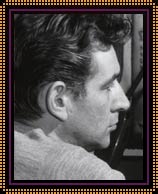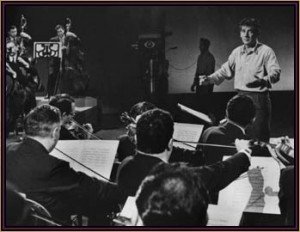 Bernstein was a major and charismatic figure in modern classical music and the Broadway musical theater. He was also a conductor, composer, pianist, author, and lecturer. A son of immigrant Russian Jews, Bernstein started to play the piano at the age of 10. In his teens he showed an early interest in the theater, organizing productions such as “The Mikado” and an unconventional adaptation of “Carmen,” in which he played the title role. Determined to make a career in music, despite his father’s insistence that “music just keeps people awake at night,” Bernstein eschewed the family beauty parlor business. He went on to study first with Walter Piston and Edward Burlingaunt Hill at Harvard, then with Fritz Reiner, Isabella Vengerova, and Randall Thompson at the Curtis Institute in Philadelphia, and finally with Serge Koussevitzky at the Berkshire Music Institute at Tanglewood. Bernstein had entered Harvard regarding himself as a pianist, but became influenced by Dimitri Mitropoulos and Aaron Copland. They inspired him to write his first symphony, “Jeremiah.” In 1943 he was chosen by Artur Rodzinski to work as his assistant at the New York Philharmonic. On November 14, 1943, Bernstein, deputized at the last minute for the ailing Bruno Walter, conducted the New York Philharmonic in a concert that was broadcast live on network radio. The next day, he appeared on the front pages of the newspapers and became a celebrity overnight.
Bernstein was a major and charismatic figure in modern classical music and the Broadway musical theater. He was also a conductor, composer, pianist, author, and lecturer. A son of immigrant Russian Jews, Bernstein started to play the piano at the age of 10. In his teens he showed an early interest in the theater, organizing productions such as “The Mikado” and an unconventional adaptation of “Carmen,” in which he played the title role. Determined to make a career in music, despite his father’s insistence that “music just keeps people awake at night,” Bernstein eschewed the family beauty parlor business. He went on to study first with Walter Piston and Edward Burlingaunt Hill at Harvard, then with Fritz Reiner, Isabella Vengerova, and Randall Thompson at the Curtis Institute in Philadelphia, and finally with Serge Koussevitzky at the Berkshire Music Institute at Tanglewood. Bernstein had entered Harvard regarding himself as a pianist, but became influenced by Dimitri Mitropoulos and Aaron Copland. They inspired him to write his first symphony, “Jeremiah.” In 1943 he was chosen by Artur Rodzinski to work as his assistant at the New York Philharmonic. On November 14, 1943, Bernstein, deputized at the last minute for the ailing Bruno Walter, conducted the New York Philharmonic in a concert that was broadcast live on network radio. The next day, he appeared on the front pages of the newspapers and became a celebrity overnight.
In the same year, he wrote the music for “Fancy Free,” a ballet, choreographed by Jerome Robbins, about three young sailors on 24 hours’ shore leave in New York City. It was so successful that they expanded it into a Broadway musical, with libretto and lyrics by Betty Comden and Adolph Green. Retitled “On the Town” and directed by George Abbott, it opened in 1944, with a youthful, vibrant score, which included the memorable anthem “New York, New York,” “Lonely Town,” “I Get Carried Away,” and “Lucky to Be Me.” The 1949 film version, starring Frank Sinatra and Gene Kelly and directed by Kelly and Stanley Donen, is often regarded as innovatory in its use of real New York locations, although Bernstein’s score was somewhat truncated in the transfer. In 1950 Bernstein wrote both music and lyrics for a musical version of J. M. Barrie’s “Peter Pan,” starring Jean Arthur and Boris Karloff. His next Broadway project, “Wonderful Town” (1953), adapted from the play “My Sister Eileen,” by Joseph Fields and Jerome Chodorov, again had lyrics by Comden and Green, and starred Rosalind Russell, returning to Broadway after a distinguished career in Hollywood. Bernstein’s spirited, contemporary score, for which he won a Tony Award, included “Conversation Piece,” “Conga,” “Swing,” “What a Waste,” “Ohio,” “A Quiet Girl,” and “A Little Bit of Love.” The show had a successful revival in London in 1986, with Maureen Lipman in the starring role.

Leonard Bernstein conducting the New York Philharmonic at CBS Studios.
Bernstein’s greatest triumph in the popular field came with “West Side Story” in 1957. This brilliant musical adaptation of Shakespeare’s “Romeo and Juliet” was set in the streets of New York, and highlighted the violence of the rival gangs, the Jets and the Sharks. With a book by Arthur Laurents, lyrics by Sondheim in his first Broadway production, and directed by Jerome Robbins, Bernstein created one of the most dynamic and exciting shows in the history of the musical theater. The songs included “Jet Song,” “Something’s Coming,” “Maria,” “Tonight,” “America,” “Cool,” “I Feel Pretty,” “Somewhere,” and “Gee, Officer Krupke.” In 1961, the film version gained 10 Academy Awards, including Best Picture. Bernstein’s music was not eligible for an award because it had not been written for the screen. In 1984, he conducted the complete score of “West Side Story” for the first time, in a recording for Deutsche Grammophon, with a cast of opera singers including Kiri Te Kanawa, José Carreras, Tatania Troyanos, and Kurt Allman. Bernstein’s last Broadway show, “1600 Pennsylvania Avenue” (1976), was an anticlimax. A story about American presidents, with book and lyrics by Alan Jay Lerner, it closed after only seven performances. Among Bernstein’s many other works was the score for the Marlon Brando movie, ON THE WATERFRONT (1954), for which he was nominated for an Oscar; a jazz piece, “Prelude, Fugue and Riffs,” premiered on U.S. television by Benny Goodman in 1955; and “My Twelve Tone Melody” written for Irving Berlin’s 100th birthday in 1988.
Leonard Bernstein
- "Candide"
- "On the Town"
- "Peter Pan"
- "West Side Story"
- "Wonderful Town"
- Comden and Green
- Barbara Cook
- Arthur Laurents
- Alan Jay Lerner
- Harold Prince
- Chita Rivera
- Jerome Robbins
- Stephen Schwartz
- Stephen Sondheim
Source: Biographical information provided by MUZE. Excerpted from the ENCYCLOPEDIA OF POPULAR MUSIC, edited by Colin Larkin. © 2004 MUZE UK Ltd.
Photo credits: Photofest and the Library of Congress

